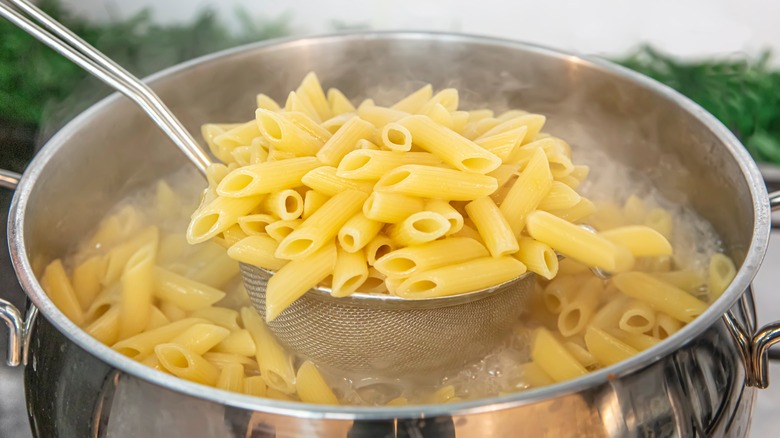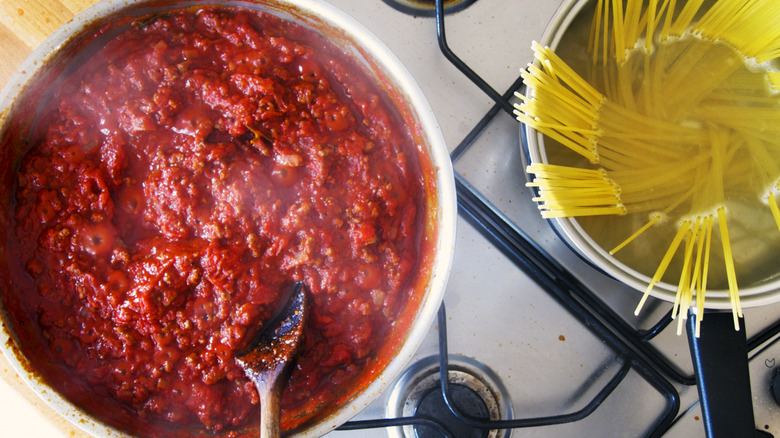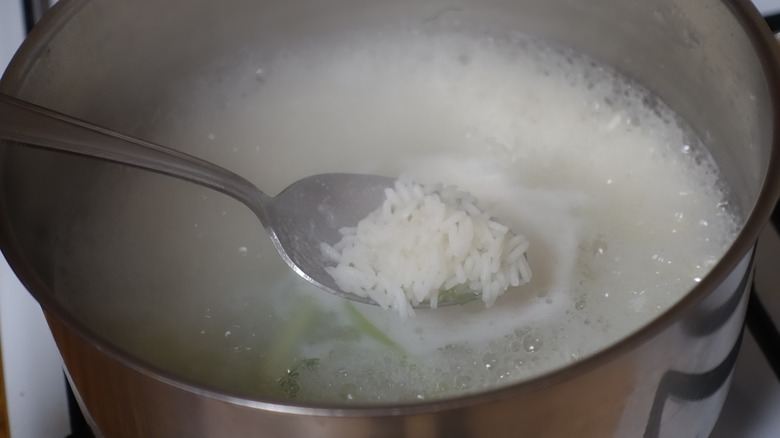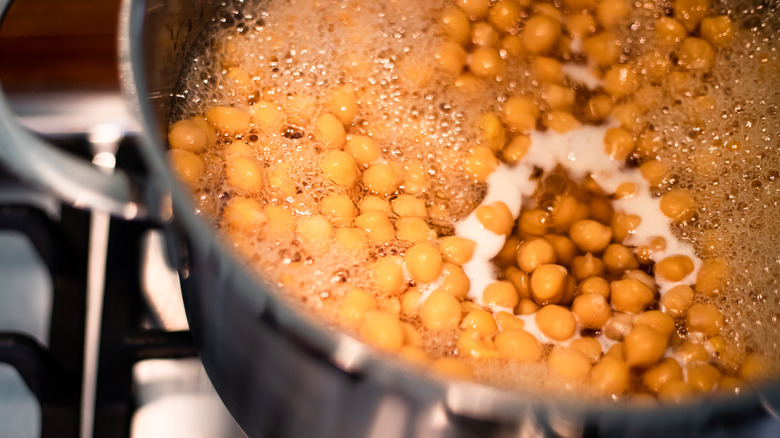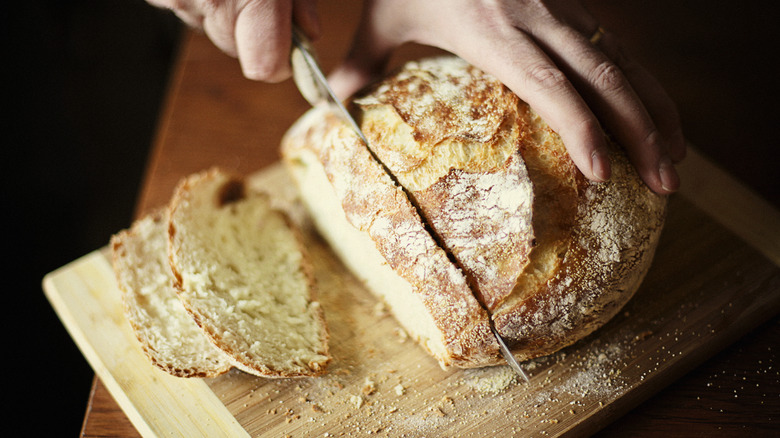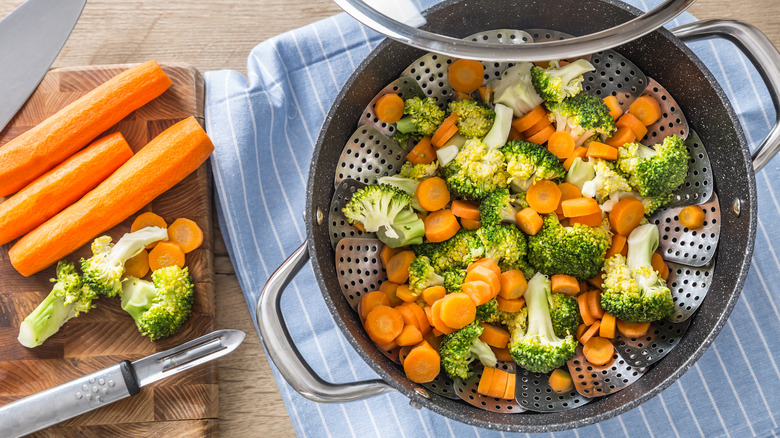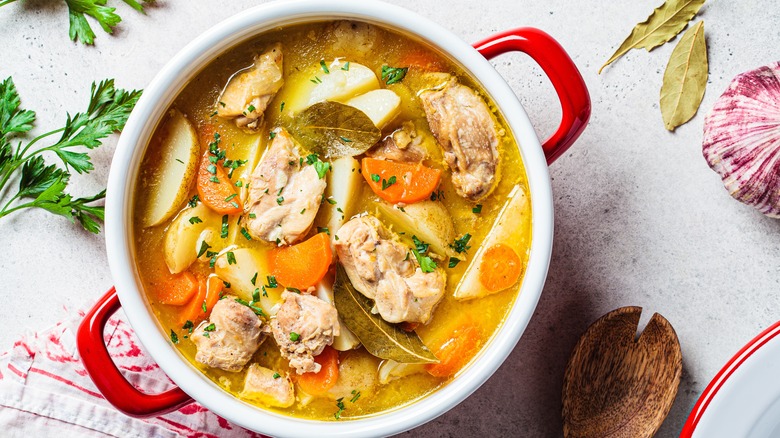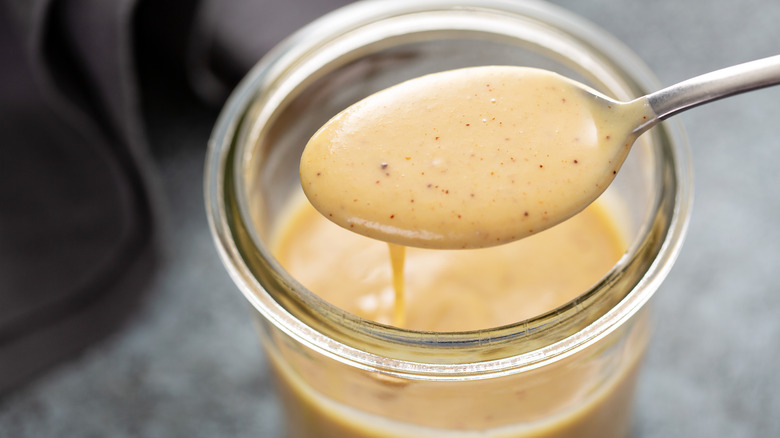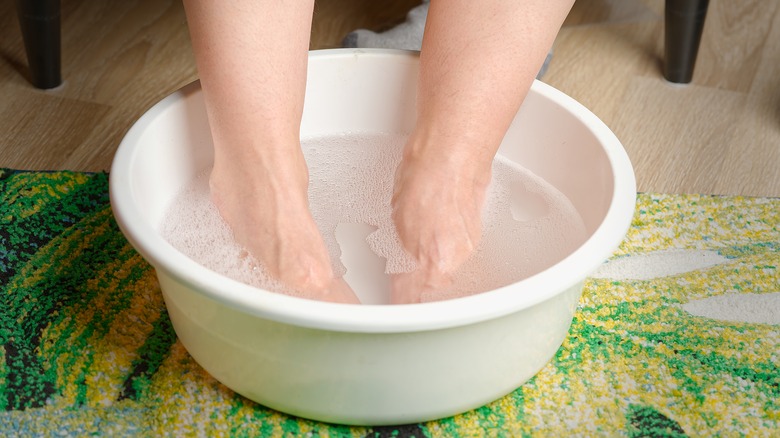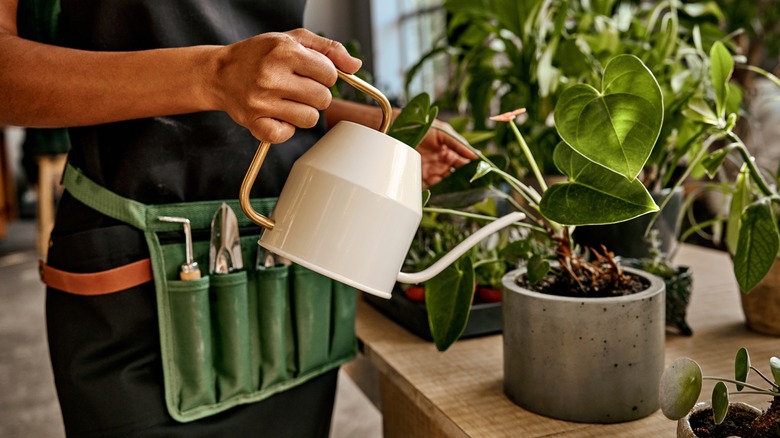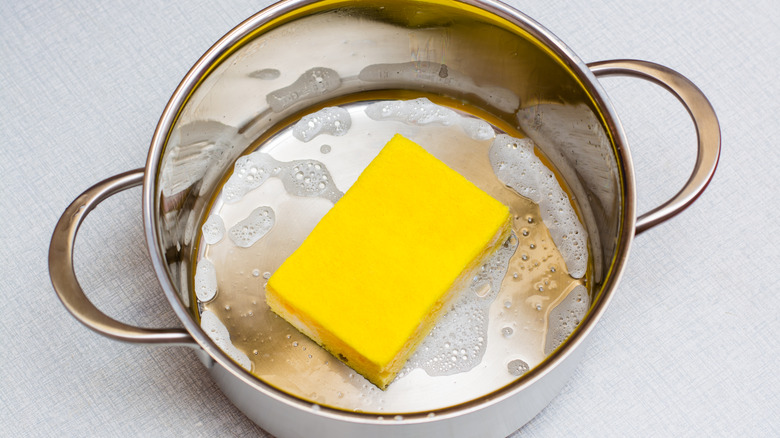11 Ways To Use Leftover Pasta Water, According To Experts
When whipping up a batch of perfectly cooked pasta for dinner, most of us simply pour the water we've boiled it in down the drain without a second thought. But in fact, in doing this, we're wasting an array of different repurposing opportunities for this supposed by-product. Pasta water, the salty, starchy liquid that's left over after cooking, actually has a remarkably diverse range of applications.
This seemingly drab and murky liquid is actually rich in starch and minerals, and holds properties that can enhance the flavors and textures of your dishes. Kat Lieu, cookbook author and founder of Subtle Asian Baking, describes pasta water as being "like a very diluted cornstarch slurry and can help slightly thicken your soups, sauces, or stews, or make food more velvety, and the salt in it will help season your food." Plus, its uses extend beyond the kitchen, too. This cooking liquid can serve as a handy tool for doing household chores, from watering plants to washing your hair.
With the help of some experts, we've uncovered 12 of the most ingenious ways to repurpose your leftover pasta water, helping you to make the most of this unassuming cooking liquid. Whether you're looking to elevate your cooking, try some new home hacks, or simply adopt eco-friendly practices, these top tips will leave you viewing pasta water in a whole new light.
Use it to thicken sauces
A popular use for pasta water that you may already have experimented with in your home cooking is adding it to sauces to thicken them up. Many pasta recipes instruct us to reserve a small amount of the pasta cooking water and add it back in with the other ingredients in the dish towards the end of cooking. Some of our favorite recipes that put the starchiness of the pasta water to good use include butternut squash pasta and creamy shrimp diablo.
Natasha Kravchuk, founder, recipe developer, and cookbook author at Natasha's Kitchen, provided us with some insight on pasta water's amazing properties, stating, "Pasta water is packed with starch, which is drawn out from the pasta during cooking. This starch gives the water a slightly thick quality that helps thicken up your sauces." As well as having this useful thickening effect, the starchiness of the liquid also helps to bind and emulsify sauces. Natasha adds, "Using pasta water gives the sauce a creamy and luxurious texture without the need for extra fat or cream."
Once you add your pasta to the pasta-water-enhanced sauce, you'll also find that the two cling together perfectly. Kyle Taylor, chef and culinary enthusiast at HE COOKS, tells us that pasta water "helps [to] integrate the sauce's flavors with the pasta, making the dish more cohesive." That silky texture it provides is just perfect for ensuring every piece of pasta gets fully coated in delicious sauciness.
Reuse it to cook rice
You've cooked your pasta in it, but why not use the same water to whip up some rice? Reboiling your pasta water is no problem at all, and in fact, it can provide rice with some extra flavor whilst also enhancing its texture.
Since pasta water typically contains a generous sprinkling of salt, this will infuse into the rice, seasoning it perfectly. The starchiness of the pasta water can also make the rice more cohesive, which is great if you're aiming for sticky rice for adding to sushi or stir-fries.
If you're prepping the pasta and rice one after the other, you can simply boil the pasta first, then transfer the leftover pasta water into another pot and get the rice going. But, if you're cooking the rice later, just store the pasta water in the fridge until you need it. Make sure to let it come to room temperature first and transfer it to an airtight container before refrigerating. It will keep well for up to three days. If you need to store it for longer than this, try pouring the pasta water into ice cube trays and popping them in the freezer, where they'll keep for up to six months.
Reuse it to cook dried beans
Another staple that's perfect for cooking up in your leftover pasta water is dried beans. This is a fantastic way to infuse the beans with flavor and create a wonderful creamy texture, with the starchy, seasoned water truly elevating your beans.
With its high starch and salt content, pasta water can help to soften the beans and add an extra element of flavor. With the starch acting as a natural thickening agent, the tender beans will come out with a smooth, creamy broth that makes them extra delicious.
Pasta water can be used both for soaking and boiling the dried beans. Just make sure to use two separate batches of pasta water for the initial soak and the cooking. Once the beans have soaked overnight, transfer them to a pot, cover with the fresh pasta water, and bring to a boil. Reduce the heat, cover, and simmer until the beans are tender. The cooking time can vary from around one to two hours, depending on the type of bean. You may find that the salty pasta water alone already has enough seasoning, but feel free to adjust this to taste by adding extra salt and pepper to the beans. There's also the option to enhance the beans even further by adding some flavorful aromatics like garlic, onion, or herbs.
Use it to bake bread or pizza crusts
If you're a seasoned home-baker, a hearty homemade bread and pizza crust might already be in your recipe repertoire. But, most recipes for these carby delights don't feature our secret ingredient — pasta water of course.
Leftover pasta water can be used to upgrade your bread or pizza, giving both an amazing texture and depth of flavor. Again, it's that nifty starch that enhances the dough. Kyle Taylor of HE COOKS explains, "The starch in the pasta water gelatinizes during cooking, helping the crust brown better and become crispy while staying tender on the inside." This cooking liquid can also help a homemade loaf of bread to rise effectively. The starch in the pasta water contains sugar, which activates the yeast in bread recipes and therefore helps the dough to rise effectively. The extra starch also helps the bread to retain moisture, which means a softer final loaf.
Can you simply switch out the water in a standard bread or pizza crust recipe for pasta water and let the starchy magic happen? If the pasta water is salty, you may need to reduce or omit the salt in the recipe, too. Cookbook author Kat Lieu also shares a top tip to try during pizza baking, stating, "If you spray the crust while it's baking in the oven with some pasta water, it will add to the crispiness. It's like making baguettes, you want steam, and (...) starchy pasta water can help."
Steam your veggies
Another excellent way to give your pasta water a second life is to steam veggies with it. Steaming is a fantastic cooking method for preserving all of those wonderful nutrients in the vegetables, and by using leftover pasta water to do so, you're saving water, energy, and time. Wins all round!
Preparing some perfectly steamed veggies to enjoy alongside your pasta dish is pretty common practice, and there's really no need to boil fresh water for this. As the pasta water is already nice and hot, you won't have to wait for it to heat up in the steamer, so your veggies will be ready in no time.
Whilst the pasta is boiling, grab your vegetables of choice for steaming, such as broccoli, green beans, or carrots, and chop them up if needed. Then, you can set up the steamer. Just before you're ready to drain the pasta, scoop out some of the water and pop it into the steamer pot, before placing the steamer basket on top. Add the veggies, cover, and steam until tender. If you have a large, deep cooking pot, you could even steam your vegetables at the same time as boiling the pasta, by adding the steamer basket on top.
Make soups and stews
Incorporating leftover pasta water into your soups and stews is a surefire way to make them extra delicious, all while reducing waste, too. The starchy, seasoned water enhances the all-important base of the dish, much like a vegetable broth would. According to Natasha Kravchuk, "Pasta water is a smart addition to soups and stews because of its starch content. Since starch is a natural thickener, it will give your soups and stews a richer, heartier texture." And it's not just the consistency of your soup or stew that pasta water can improve. "It also helps to enhance the savory flavors of the soup, making the broth even tastier," says Natasha.
Simply start prepping your soup or stew with the usual base ingredients such as onions, carrots, celery, and garlic. Then, at the point where you'd typically pour in the broth, add the pasta water instead, adjusting the quantity depending on how thick you'd like the final dish to be.
The pasta water can be used in place of part or all of your broth. If you really want to maximize its use, you can even boil veggies in the leftover pasta water before adding it to the soup or stew, which will impart even more delicious flavor into the liquid. Taste your soup or stew before serving and adjust the seasoning as needed. Again, the pasta water may already add some saltiness, so be careful not to over-season.
Loosen up dressings and marinades
We know that pasta water is great for thickening up sauces, but it can also serve as a tool for thinning out dressings and marinades used in your cooking. Next time you're whipping up a pasta salad, make sure to save some of the cooking water.
The starch in pasta water acts as an emulsifier, which can help to combine those classic salad dressing ingredients of oil and vinegar together. The saltiness of the water can also subtly season your dressings and marinades, adding an extra layer of flavor without being too overpowering.
After cooking your pasta, set aside a small amount of the leftover water and let it cool to room temperature. Then, combine your dressing or marinade ingredients in a bowl. You could opt for an Asian-inspired marinade with soy sauce, rice vinegar, garlic, and ginger, or perhaps a creamy Caesar dressing with lemon, mustard, egg yolks, and anchovies. Once you've combined the ingredients, whisk in some of the pasta water, one tablespoon at a time, until you've reached the desired consistency. You'll find that the texture becomes wonderfully smooth and silky.
Soak your feet in it
We're moving away from the kitchen with this slightly more unusual use for your leftover pasta water. Yes, it's true — pasta water can make a fantastic natural remedy for tired feet. Rich in minerals and starch, pasta water can help to soothe, soften, and rejuvenate your skin.
This starchy water is thought to contain minerals like calcium and magnesium, which have leached out of the pasta during cooking. These minerals can help soften and hydrate your skin, and the heat can relieve any aches and pains. Plus, since the water is already hot, you won't need to waste any extra energy warming it up. You could even soak your feet while you tuck into that bowl of pasta!
After cooking your pasta, let the water cool down to a comfortably warm temperature. You don't want to burn your skin. Then, transfer it into a large bowl, submerge your feet, sit back, and relax. If you want to bring an extra touch of luxury to the experience, add a few drops of essential oil like lavender or peppermint, or perhaps a sprinkling of epsom salts.
Water your plants with it
Is not just us who can benefit from the nourishing properties of pasta water; you can also use this versatile liquid to keep your plants happy. Watering your indoor and outdoor plants with leftover pasta water is an eco-friendly and resourceful way to help your garden grow. The nutrients in the liquid provide a range of benefits to the plants, helping to keep them healthy. Pasta water contains minerals like potassium and phosphorus, which plants need to thrive. The starch in the water can also help to feed the soil microorganisms, creating a healthier soil ecosystem for the plant.
Once you've reserved your pasta water after cooking, allow it to cool to room temperature. Unlike our other pasta water hacks, this one calls for unsalted water since too much salt can harm your plants. Pour the cooled pasta water directly onto the soil of your indoor or outdoor plants, as you normally would with plain water. It's important to keep in mind that pasta water cannot serve as a replacement for plant feeds and fertilizers, so incorporate it into your watering routine as an added bonus rather than switching it out for plant food.
Wash the dishes with it
Believe it or not, leftover pasta water can be a surprisingly effective dishwashing aid. Its starchy nature helps break down food residue, making it easier to clean your dishes without the need for harsh chemicals.
Once you've drained and reserved your pasta water, you can put it to work tackling stubborn grease and grime right away. Using the liquid while it's as hot as possible will further aid in lifting any stuck-on bits of food. Either pour the pasta water into a large basin and place the dirty dishes, pots, and pans into the water, or simply add it directly to the pots and pans themselves. Then, leave everything to soak for about 15 minutes so everything can loosen up. The hot, starchy water will help to dissolve the grime.
Now, you should be able to remove the residue easily by scrubbing lightly with a sponge or dish brush. No elbow grease required! Then, simply wash your dishes as normal and give them a final rinse with clean water to remove any signs of starchiness.
Use it for your next hair wash
Just when you thought pasta water couldn't get any more versatile, we have one final unique way you can put it to use. The leftover liquid in your pasta pot can also serve as a nourishing treatment for your hair.
You might've heard about the supposed benefits of rice water for the hair, with claims that this humble liquid can make your hair grow stronger and longer, so how does pasta water compare? Well, rice water and pasta water are both starchy in nature. It's the starch content of rice water that allows it to coat the hair, giving your locks a thick and shiny appearance, so theoretically, pasta water should have a similar effect. The minerals present in the pasta water can also help to nourish and soften your scalp.
The best way to use pasta water on your hair is as a prewash treatment before shampooing. First, cool the pasta water to a lukewarm temperature. Then, pour it over your head, massaging it into your scalp and working it through to the ends of your hair. Leave it to sit for 10 minutes so the goodness can settle in, then wash and condition as normal. You should see immediate results, with the pasta water leaving your hair looking and feeling strong and shiny.
